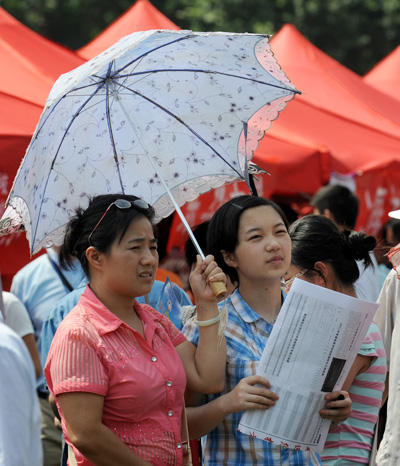|
 |
|
EYING THE FUTURE: A high school graduate and her mother attend a college admission consultation fair in Zhengzhou, Henan Province, on June 25 (LI BO) |
Sitting the once-a-year National College Entrance Exam and getting a high score are believed to be the only path to attend prestigious universities in China. However, a recent study shows that being male increases the chances due to discriminatory enrollment practices.
In August, the Media Monitor for Women Network, a Beijing-based non-governmental organization for protecting women's rights, released a report on gender discrimination in college recruitment of undergraduate students. The report concluded that at least 74 of China's 112 national key universities and colleges have listed discriminating requirements in their admission policies. The study confined its data collection to information on official websites of these universities and colleges and reports by major media organizations.
A long struggle
The sexual bias in college admission was widely reported for the first time in 2005. Peking University, one of the best internationally ranked universities in China, was reported to impose high score standards on female candidates when recruiting for majors of less popular foreign languages, such as Vietnamese, Korean and Thai. In that year, the university announced in July that its lowest admission score for science students from Beijing was 619 for males and 636 for females. In response to waves of criticism, Liu Shuxiong, then Associate Dean of the School of Foreign Languages of Peking University, argued that the school needed to maintain a sex ratio among its students, of whom more than 70 percent were female.
Liu, also a professor of Hindi, said that he was teaching a class of 15 students, with only two males.
In 2006, the Ministry of Education (MOE) imposed a ban on setting sex ratios during college recruitment without its authorization. However, several newspapers reported in July 2012 that in the early decision stage of admission, some universities accepted male and female students separately to maintain a gender ratio, resulting in a skewed playground for girls. Administrators of some universities even told the media that such an admission policy was to limit the number of female students.
On July 9, 2012, Lu Pin, chief of the Media Monitor for Women Network, and lawyer Wang Yizhi respectively sent an application to the MOE, demanding the disclosure of information on which majors from which universities had been authorized to set a gender ratio in admission and on what basis.
The MOE responded to them a month later, saying that "some majors in a small number of universities are allowed to maintain a gender ratio when admitting students out of the concerns for national interests and their special needs." The reply stressed that these universities must clearly list such a gender-balance concern in their enrollment plans.
On August 30, 2012, four women shaved their heads bald in Guangzhou, Guangdong Province, in protest against the ambiguous response of the MOE. They also demanded knowing the "special needs" in their petition.
On October 15, 2012, the MOE wrote a letter in response to a women's legal aid organization based in Beijing and divided the majors alleged to have special needs into three categories, those concerning special vocations with gender ratio requirements, such as majors of national defense and public security; those unsuitable for women out of health concerns, such as majors of sailing and mining; and those with limited educational resources and gender-balanced demands in the labor market, such as majors of less popular foreign languages and broadcast journalism.
The Chinese People's Public Security University admitted a total of 1,840 students for undergraduate studies in 2012, only 214 or 11.63 percent were female.
Rong Weiyi, a professor at the university, said that this can be partly attributed to misconceptions that female police officers are less courageous than their male colleagues. She admitted that in reality female officers do face limits when performing certain tasks.
In January, Sun Xiaobin, a senior MOE official from the Department of Policies and Regulations, said in an interview that the ministry would further limit the gender requirement against women in college recruitment.
In May, the MOE issued regulations on college recruitment for 2013, saying that only some special institutions and majors concerning military, national defense and public security are allowed to exercise an enrollment gender ratio.
| 